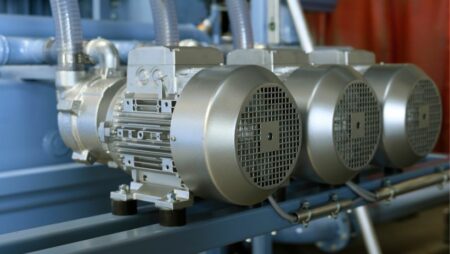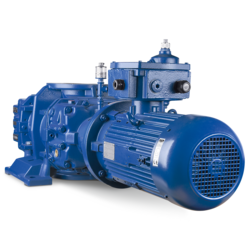产品说明
产品说明
2BV series liquid ring vacuum pump is suitable for pumping gas and water steam.suction pressure can reach 33mbar absolute pressure (97% vacuum degree).when the vacuum pump in the suction pressure below 80mbar for a long time, should be connected to the cavitation protection pipe to protect the pump, If with atmospheric ejector inspiratory pressure up to 10mbar, The ejector can be installed directly on the vacuum pump. When used as a compressor, its pressure is up to 0.26Mh(absolute pressure)
2BV series liquid ring vacuum pump and compressor are widely used in petrochemical, pharmaceutical, food, sugar, plastic industry and other fields,because in the process of working, the gas compression process is isothermal, so in the compression and suction of flammable and explosive gas, it is not easy to occur danger, its application is more widely.
Features:
Machine pump coaxial direct connection design, save space, easy to install, easy tomaintain;
Mechanical seal is used as the standard configuration, the flexible valveplate automatically adjusts the size of the vent hole, Realize high efficiency and energy saving, no liquid leak and no enoenvironmental pollution.
Stable operation, noise can be as low as 62 decibels, small size, easyto handle;
The uniform corrosion resistance design, bronze impeller improves the corrosion resistanceof the pump, stainless steel material is more suitable for more load engraving requirements
The unique flexible exhaust port design, which does not produce excessivecompression, ensures the best efficiency in the performance range of 2BVA.
Sample selection
1. Design point parameters:Inspiratory
capacity V=100m3/h
Inspiratory pressure P1=40mbar.a.
2. Other parameters are in the samestandard state (see note).
Select the curve 3 that is closest to thedesign point
3. which is 71Vin this example
According to the curve number, find out the corresponding producto model, that is, the order number, but only the standard type)
In this example, from 71V, the suitable type is
2BV071-0NCO3-7p
Note
The performance curve is obtained under the condition of suction medium of20°C siquid temperature of15°C, exhaust pressure of 1013mbar, the performance tolerance
On the left side of the figure is the performance curve with the atmosphere 1 emitter
产品参数
| 模型 | Motor power kW | Max. air m3/h | Limit pressure mbar | suction diameter mm | Output diameter mm | Limit pressure with Primary air pump hpa |
| 2BV2060 | 0.81 | 27 | 33 | G1″ | G1″ | 10 |
| 2BV2061 | 1.45 | 55 | 33 | G1″ | GV | 10 |
| 2BV2070 | 2.35 | 80 | 33 | G1/2″ | G1/2″ | 10 |
| 2BV2071 | 3.85 | 110 | 33 | G1/2″ | G1/T | 10 |
| 2BV5110 | 4 | 165 | 33 | DN50 | DN50 | 10 |
| 2BV5111 | 5.5 | 230 | 33 | DN50 | DN50 | 10 |
| 2BV5121 | 7.5 | 280 | 33 | DN65 | DN65 | 10 |
| 2BV5131 | 11 | 400 | 33 | DN65 | DN65 | 10 |
| 2BV5161 | 15 | 500 | 33 | DN80 | DN80 | 10 |
关于我们
Detailed Photos
Company presentation
Workshop display
Warehouse display
Product gallery
| 售后服务: | Online |
|---|---|
| 保修: | 1 Years |
| Oil or Not: | Oil Free |
| 结构 | 旋转真空泵 |
| Exhauster Method: | Kinetic Vacuum Pump |
| 真空度 | High Vacuum |
| 定制: |
可用
|
|
|---|

What Are the Advantages of Using Oil-Sealed Vacuum Pumps?
Oil-sealed vacuum pumps offer several advantages in various applications. Here’s a detailed explanation:
1. High Vacuum Performance: Oil-sealed vacuum pumps are known for their ability to achieve high levels of vacuum. They can create and maintain deep vacuum levels, making them suitable for applications that require a low-pressure environment. The use of oil as a sealing and lubricating medium helps in achieving efficient vacuum performance.
2. Wide Operating Range: Oil-sealed vacuum pumps have a wide operating range, allowing them to handle a broad spectrum of vacuum levels. They can operate effectively in both low-pressure and high-vacuum conditions, making them versatile for different applications across various industries.
3. Efficient and Reliable Operation: These pumps are known for their reliability and consistent performance. The oil-sealed design provides effective sealing, preventing air leakage and maintaining a stable vacuum level. They are designed to operate continuously for extended periods without significant performance degradation, making them suitable for continuous industrial processes.
4. Contamination Handling: Oil-sealed vacuum pumps are effective in handling certain types of contaminants that may be present in the process gases or air being evacuated. The oil acts as a barrier, trapping and absorbing certain particulates, moisture, and chemical vapors, preventing them from reaching the pump mechanism. This helps protect the pump internals from potential damage and contributes to the longevity of the pump.
5. Thermal Stability: The presence of oil in these pumps helps in dissipating heat generated during operation, contributing to their thermal stability. The oil absorbs and carries away heat, preventing excessive temperature rise within the pump. This thermal stability allows for consistent performance even during prolonged operation and helps protect the pump from overheating.
6. Noise Reduction: Oil-sealed vacuum pumps generally operate at lower noise levels compared to other types of vacuum pumps. The oil acts as a noise-damping medium, reducing the noise generated by the moving parts and the interaction of gases within the pump. This makes them suitable for applications where noise reduction is desired, such as laboratory environments or noise-sensitive industrial settings.
7. Versatility: Oil-sealed vacuum pumps are versatile and can handle a wide range of gases and vapors. They can effectively handle both condensable and non-condensable gases, making them suitable for diverse applications in industries such as chemical processing, pharmaceuticals, food processing, and research laboratories.
8. Cost-Effective: Oil-sealed vacuum pumps are often considered cost-effective options for many applications. They generally have a lower initial cost compared to some other types of high-vacuum pumps. Additionally, the maintenance and operating costs are relatively lower, making them an economical choice for industries that require reliable vacuum performance.
9. Simplicity and Ease of Maintenance: Oil-sealed vacuum pumps are relatively simple in design and easy to maintain. Routine maintenance typically involves monitoring oil levels, changing the oil periodically, and inspecting and replacing worn-out parts as necessary. The simplicity of maintenance procedures contributes to the overall cost-effectiveness and ease of operation.
10. Compatibility with Other Equipment: Oil-sealed vacuum pumps are compatible with various process equipment and systems. They can be easily integrated into existing setups or used in conjunction with other vacuum-related equipment, such as vacuum chambers, distillation systems, or industrial process equipment.
These advantages make oil-sealed vacuum pumps a popular choice in many industries where reliable, high-performance vacuum systems are required. However, it’s important to consider specific application requirements and consult with experts to determine the most suitable type of vacuum pump for a particular use case.

真空泵能否用于太阳能电池板的生产?
是的,真空泵广泛用于太阳能电池板的生产。下面是详细说明:
太阳能电池板又称光伏(PV)板,是一种将太阳光转化为电能的装置。太阳能电池板的制造过程涉及多个关键步骤,其中许多步骤都需要使用真空泵。真空技术在确保太阳能电池板生产的效率、可靠性和质量方面发挥着至关重要的作用。以下是使用真空泵的一些关键领域:
1.硅锭生产:太阳能电池板制造的第一步是生产硅锭。这些硅锭是纯晶体硅的圆柱块,是太阳能电池的原材料。真空泵用于 Czochralski 工艺,该工艺包括在石英坩埚中熔化多晶硅,然后从熔化的硅中缓慢拉出单晶硅锭。在晶体生长过程中,真空泵通过去除杂质和防止污染来创造受控环境。
2.晶片化:硅锭生产出来后,要进行晶圆切割,将硅锭切成薄晶圆。线锯中使用真空泵来创造低压环境,帮助冷却和润滑切割线。真空还有助于清除切片过程中产生的硅碎片,确保切割干净、精确。
3.太阳能电池生产:真空泵在太阳能电池生产的各个阶段都发挥着重要作用。太阳能电池是太阳能电池板中将太阳光转化为电能的独立单元。真空泵用于以下过程:
- 扩散:在扩散过程中,将磷或硼等掺杂剂引入硅晶片,以产生所需的电气特性。扩散炉中使用真空泵为扩散过程创造受控气氛,并清除可能影响太阳能电池质量的任何杂质或气体。
- 沉积:在硅晶片上沉积抗反射涂层、钝化层和电极材料等薄膜。真空泵用于各种沉积技术,如物理气相沉积(PVD)或化学气相沉积(CVD),为精确、均匀的薄膜沉积创造必要的真空条件。
- 蚀刻:蚀刻工艺用于在太阳能电池上形成所需的表面纹理,从而增强光捕获并提高效率。真空泵用于等离子蚀刻或湿蚀刻技术,以去除不需要的材料或在太阳能电池上形成特定的表面结构。
4.封装:太阳能电池生产出来后,要对其进行封装,使其免受潮湿和机械应力等环境因素的影响。封装过程中使用真空泵来创造真空环境,确保从封装材料中排除空气和水分。这有助于实现适当的粘合,防止形成气泡或空隙,从而降低太阳能电池板的性能和使用寿命。
5.测试和质量控制:真空泵还可用于太阳能电池板生产过程中的测试和质量控制。例如,真空系统可用于泄漏测试,以确保封装的完整性,并检测电池板组件中任何潜在的缺陷或泄漏。真空测量技术还可用于评估太阳能电池或电池板的电气特性和效率。
总之,真空泵是太阳能电池板生产中不可或缺的设备。真空泵用于制造过程的各个阶段,包括硅锭生产、晶片、太阳能电池生产(扩散、沉积和蚀刻)、封装和测试。真空技术可实现精确控制、防止污染和高效加工,有助于生产出优质可靠的太阳能电池板。
Can Vacuum Pumps Be Used in Food Processing?
Yes, vacuum pumps are widely used in food processing for various applications. Here’s a detailed explanation:
Vacuum pumps play a crucial role in the food processing industry by enabling the creation and maintenance of vacuum or low-pressure environments. They offer several benefits in terms of food preservation, packaging, and processing. Here are some common applications of vacuum pumps in food processing:
1. Vacuum Packaging: Vacuum pumps are extensively used in vacuum packaging processes. Vacuum packaging involves removing air from the packaging container to create a vacuum-sealed environment. This process helps extend the shelf life of food products by inhibiting the growth of spoilage-causing microorganisms and reducing oxidation. Vacuum pumps are used to evacuate the air from the packaging, ensuring a tight seal and maintaining the quality and freshness of the food.
2. Freeze Drying: Vacuum pumps are essential in freeze drying or lyophilization processes used in food processing. Freeze drying involves removing moisture from food products while they are frozen, preserving their texture, flavor, and nutritional content. Vacuum pumps create a low-pressure environment that allows frozen water to directly sublimate from solid to vapor, resulting in the removal of moisture from the food without causing damage or loss of quality.
3. Vacuum Cooling: Vacuum pumps are utilized in vacuum cooling processes for rapid and efficient cooling of food products. Vacuum cooling involves placing the food in a vacuum chamber and reducing the pressure. This lowers the boiling point of water, facilitating the rapid evaporation of moisture and heat from the food, thereby cooling it quickly. Vacuum cooling helps maintain the freshness, texture, and quality of delicate food items such as fruits, vegetables, and bakery products.
4. Vacuum Concentration: Vacuum pumps are employed in vacuum concentration processes in the food industry. Vacuum concentration involves removing excess moisture from liquid food products to increase their solids content. By creating a vacuum, the boiling point of the liquid is reduced, allowing for gentle evaporation of water while preserving the desired flavors, nutrients, and viscosity of the product. Vacuum concentration is commonly used in the production of juices, sauces, and concentrates.
5. Vacuum Mixing and Deaeration: Vacuum pumps are used in mixing and deaeration processes in food processing. In the production of certain food products such as chocolates, confectioneries, and sauces, vacuum mixing is employed to remove air bubbles, achieve homogeneity, and improve product texture. Vacuum pumps aid in the removal of entrapped air and gases, resulting in smooth and uniform food products.
6. Vacuum Filtration: Vacuum pumps are utilized in food processing for vacuum filtration applications. Vacuum filtration involves separating solids from liquids or gases using a filter medium. Vacuum pumps create suction that draws the liquid or gas through the filter, leaving behind the solid particles. Vacuum filtration is commonly used in processes such as clarifying liquids, removing impurities, and separating solids from liquids in the production of beverages, oils, and dairy products.
7. Marinating and Brining: Vacuum pumps are employed in marinating and brining processes in the food industry. By applying a vacuum to the marinating or brining container, the pressure is reduced, allowing the marinade or brine to penetrate the food more efficiently. Vacuum marinating and brining help enhance flavor absorption, reduce marinating time, and improve the overall taste and texture of the food.
8. Controlled Atmosphere Packaging: Vacuum pumps are used in controlled atmosphere packaging (CAP) systems in the food industry. CAP involves modifying the gas composition within food packaging to extend the shelf life and maintain the quality of perishable products. Vacuum pumps aid in the removal of oxygen or other unwanted gases from the package, allowing the introduction of a desired gas mixture that preserves the food’s freshness and inhibits microbial growth.
These are just a few examples of how vacuum pumps are used in food processing. The ability to create and control vacuum or low-pressure environments is a valuable asset in preserving food quality, enhancing shelf life, and facilitating various processing techniques in the food industry.


editor by CX 2023-12-09